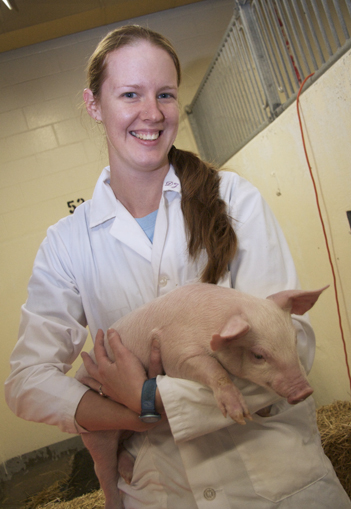
Canada's pig code of practice released
The Canadian Pork Council (CPC) and the National Farm Animal Care Council (NFACC) have released the new Code of Practice for the Care and Handling of Pigs.
By WCVM Today
"This Code reflects producers' continued commitment to animal health and welfare and dedication to responsible animal husbandry," says Florian Possberg, chair of the pig Code Development Committee.
"The groups around the table worked well together. There were many challenges to updating the code but we worked through them methodically. We took a science-informed focus, looking at what's best for the animals but also reasonable and practical for the industry."
The code's development was led by a 17-person code committee comprised of pig producers, animal welfare and enforcement representatives, researchers, transporters, processors, veterinarians and government representatives. Aiding in their work was a six-person scientific committee that included research and veterinary expertise in pig behaviour, health and welfare.
"This new Code of Practice is a turning point for the welfare of pigs in Canada," said Barbara Cartwright, CEO of the Canadian Federation of Humane Societies, the only animal welfare organization at the code table. "It signals the end of gestation stalls, an achievement secured against significant obstacles. Pigs' lives will also be improved by mandatory pain relief during castration and tail docking. However, we encourage producers to provide even higher standards than the code requires."
Canada's Codes of Practice are a powerful tool for meeting rising consumer, marketplace and societal expectations relative to farm animal welfare. Codes support responsible animal care practices and keep everyone involved in farm animal care and handling on the same page. They are our national understanding of animal care requirements and recommended practices, providing a foundation for animal care assessment programs and in some provinces, regulatory activities.
Under the NFACC Code development process, amendments to nine Codes of Practice have been undertaken since 2008. The pig code is the sixth Code of Practice to be completed with support through the Agricultural Flexibility Fund, with a further two Codes currently under revision. For more information on the code development process, visit the NFACC site.
"The groups around the table worked well together. There were many challenges to updating the code but we worked through them methodically. We took a science-informed focus, looking at what's best for the animals but also reasonable and practical for the industry."
The code's development was led by a 17-person code committee comprised of pig producers, animal welfare and enforcement representatives, researchers, transporters, processors, veterinarians and government representatives. Aiding in their work was a six-person scientific committee that included research and veterinary expertise in pig behaviour, health and welfare.
"This new Code of Practice is a turning point for the welfare of pigs in Canada," said Barbara Cartwright, CEO of the Canadian Federation of Humane Societies, the only animal welfare organization at the code table. "It signals the end of gestation stalls, an achievement secured against significant obstacles. Pigs' lives will also be improved by mandatory pain relief during castration and tail docking. However, we encourage producers to provide even higher standards than the code requires."
Canada's Codes of Practice are a powerful tool for meeting rising consumer, marketplace and societal expectations relative to farm animal welfare. Codes support responsible animal care practices and keep everyone involved in farm animal care and handling on the same page. They are our national understanding of animal care requirements and recommended practices, providing a foundation for animal care assessment programs and in some provinces, regulatory activities.
Under the NFACC Code development process, amendments to nine Codes of Practice have been undertaken since 2008. The pig code is the sixth Code of Practice to be completed with support through the Agricultural Flexibility Fund, with a further two Codes currently under revision. For more information on the code development process, visit the NFACC site.
